Pressure cooked in an Instant Pot, this delicious Kabocha Flan with caramel sauce has a silky smooth texture and rich custard flavor with a hint of sweet kabocha squash.
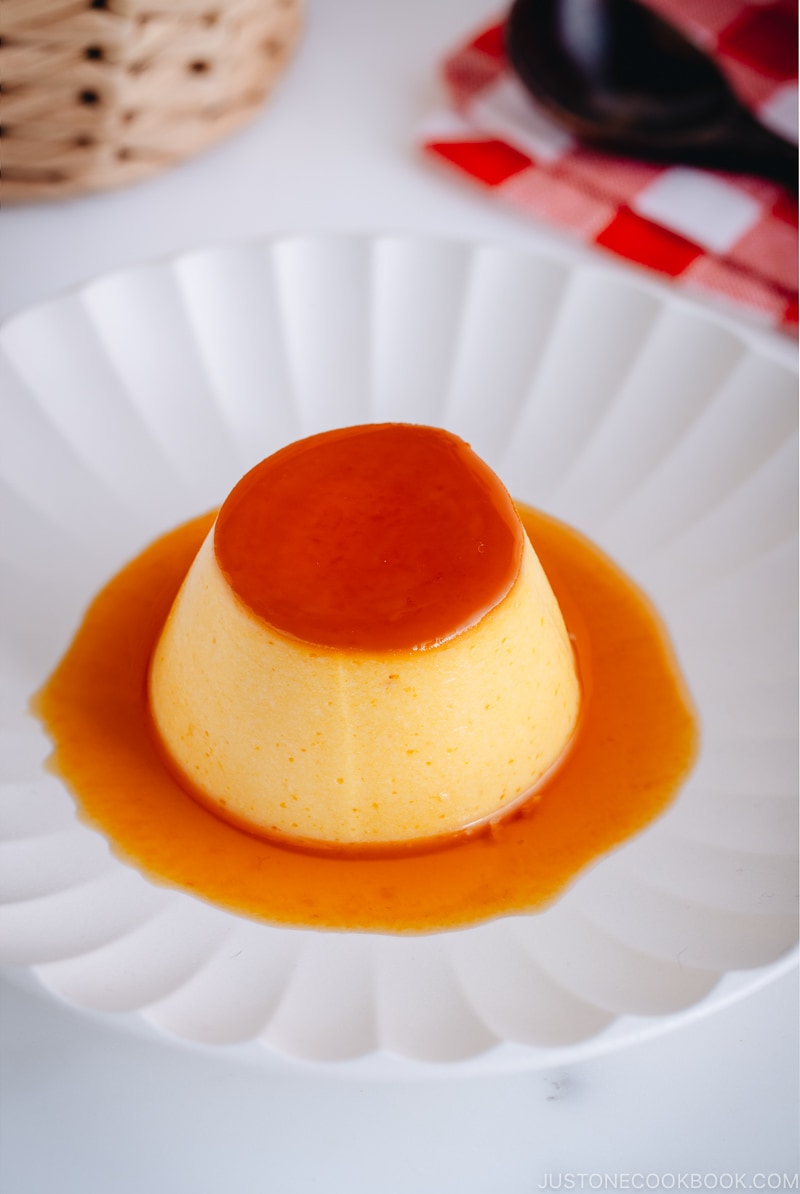
Halloween is just around the corner and I wanted to share at least one pumpkin recipe before the holiday. Pumpkins in Japan are called Kabocha (カボチャ) and it is one of the most celebrated flavors in the fall. Over here in the US, I’ve been seeing kabocha (or kabocha squash) being sold alongside pumpkins and other squashes at some local grocery stores and farmers’ markets.
Today I’m sharing a recipe for Instant Pot Kabocha Flan (かぼちゃプリン). The golden sweetness and richness of kabocha, when used in an elegant dessert like flan, really highlights how versatile the Japanese pumpkin can be. Now it is time to take out your workhorse Instant Pot and make this kabocha-flavored flan for the season.
Table of Contents
What is Kabocha?
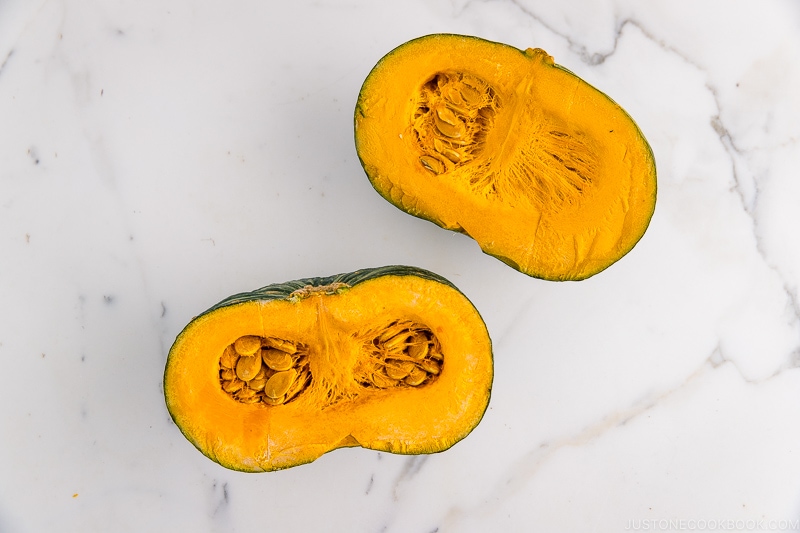
It’s called kabocha squash in the US and Japanese pumpkin in Australia. Curious about kabocha? You can read a little bit more about it here on my blog.
Cooking Tips
1. Puree kabocha for the best texture
Pureeing the kabocha is an important step for a smooth and silky texture of this flan. I used a fine mesh sieve (Uragoshiki in Japanese) to puree but you can definitely speed it up with a food processor. It is an extra step, but this helps to pulverize the fibers of the mashed kabocha. Nobody wants to see and bite into strands of fiber in their flan, so don’t skip this step!
2. Use the same size and shaped ramekins
The cooking time varies based on the size of the ramekins you use. For a consistent result, make sure your ramekins are all in the same size and shape. You don’t want to end up with a flan in a smaller ramekin over-cooked and the one in a bigger ramekin under-cooked.
3. Adjust the pressure cooking time
Adjust the cooking time if you’re using a different size ramekin than mine. For my recipe, I used 6-oz ramekins. It took 6 minutes of high-pressure cooking and 10 minutes of natural release. This 10-minute “natural release” is actually a hard stop. Do not wait until the pressure is naturally released. Remember, your flan is being “cooked” during the pre-pressure time, 6 minutes of pressure cooking, and 10 minutes of natural releasing time. This entire time is counted as cooking time.
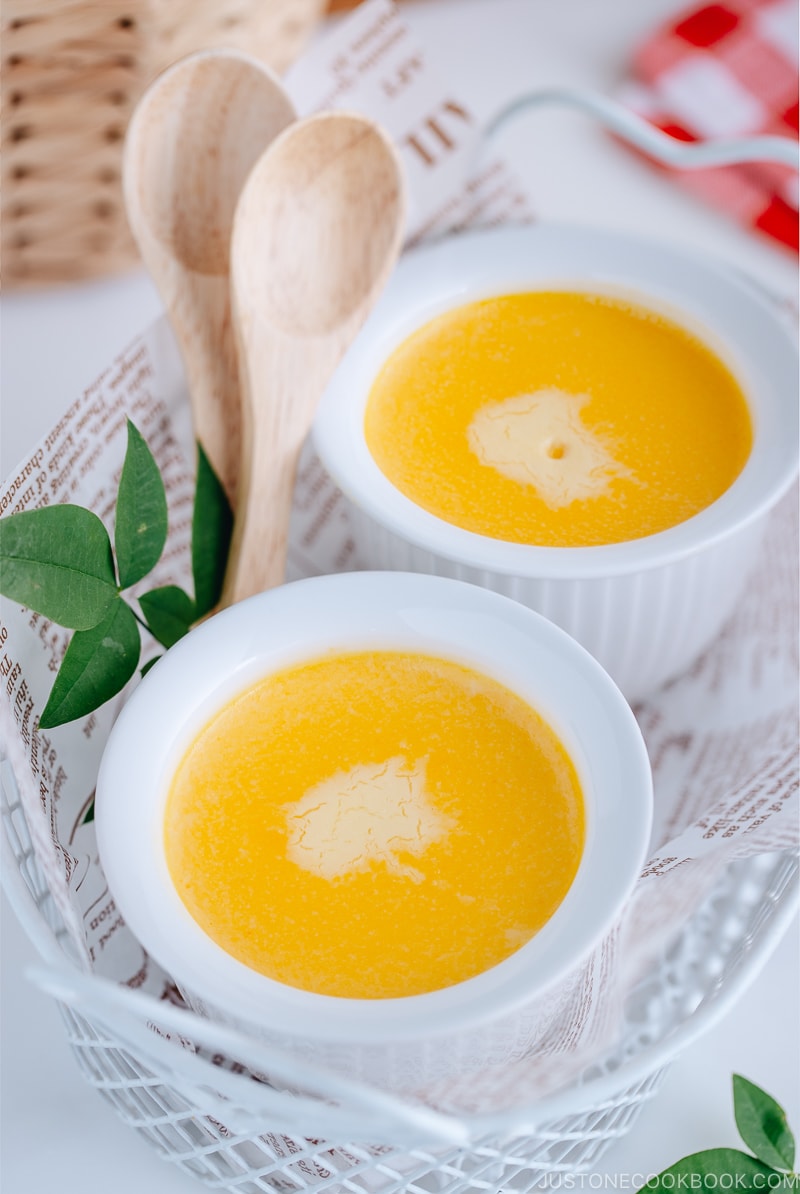
Holes Are a Big No-No for Flan
What is the number one thing you have to achieve when you make flans? In Japan, it is “a silky texture WITHOUT HOLES”. If you can see visible holes, then your flan is a failure (so harsh!). The reason why flans have very visible holes is either it’s overcooked and/or the heat is too strong.
If you look at my flan above, you can see tiny holes around the edges (a minor failure) but when you see inside the flan (see the picture below), there is no hole. Those tiny holes on the edge were created because they are right next to the ramekin and the heat was probably too direct and strong.
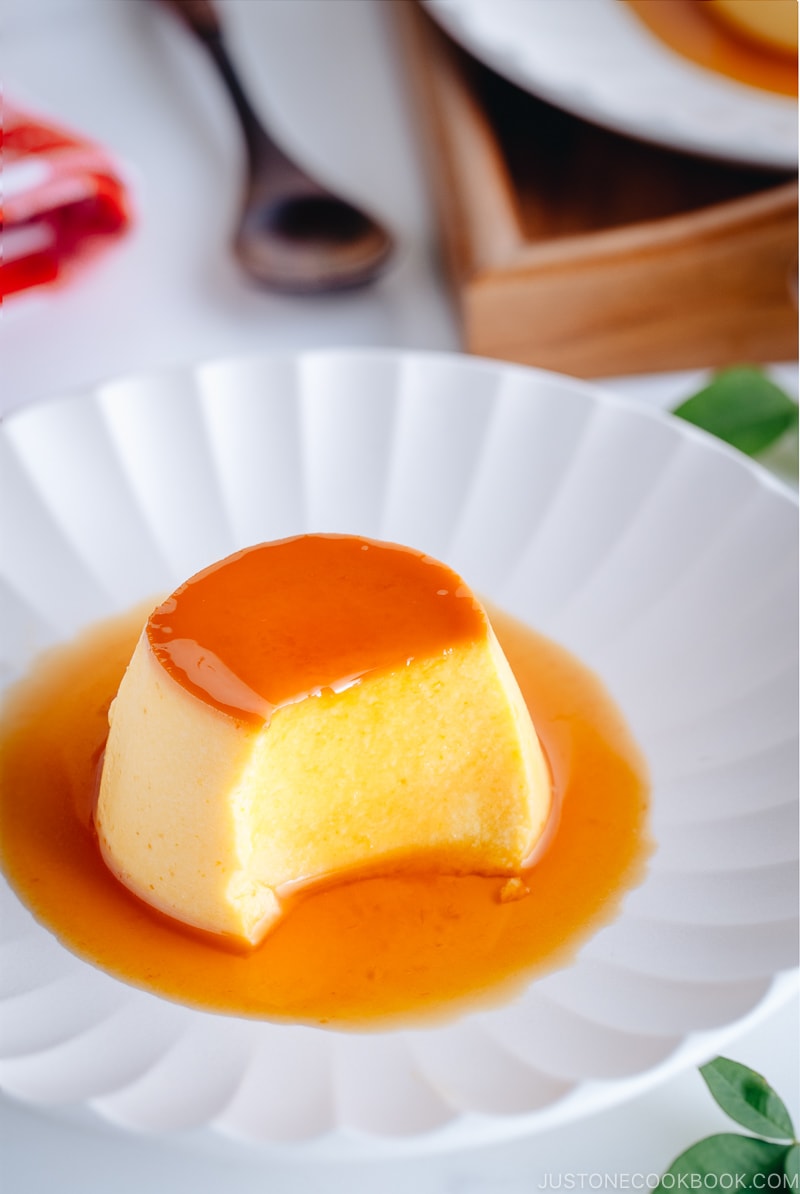
You may wonder what is wrong with holes. Well, those holes in the flan give an unpleasant texture, far from the silky smooth texture that you’re after. Therefore, watch out on cooking time and heat distribution. If you have lots of holes, even in the center of the flan, not just the outside, then you are definitely overcooking it. You can either reduce the pressure cooking time or natural release time.
Helpful Cooking Tools
1. Get a collapsible stainless steel steamer basket
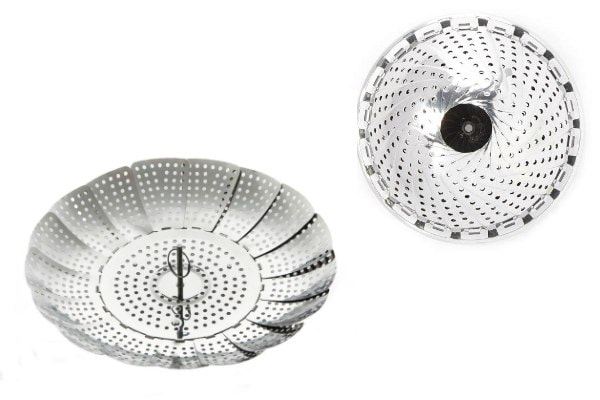
The instant pot comes with a steamer basket (wire rack) for steaming, but the gap between wires are bigger and food can easily fall down. This collapsible steamer basket has been my all-time favorite for steaming in the pot or the instant pot. It’s a great tool to have especially if you enjoy steaming vegetables and other food.
2. Strain kabocha for a smooth texture
In Japan, we have a specific kitchen utensil for straining food into a smooth texture and it’s called Uragoshiki (裏ごし器). It’s made of wooden cylinders and a fine mesh made of horsehair traditionally, but in recent years, nylon and metal have been used.
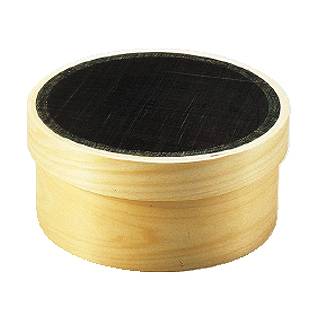
This stainless steel fine-mesh sifter can be used as a strainer for starchy food like sweet potatoes and kabocha squash in order to remove the fibers.
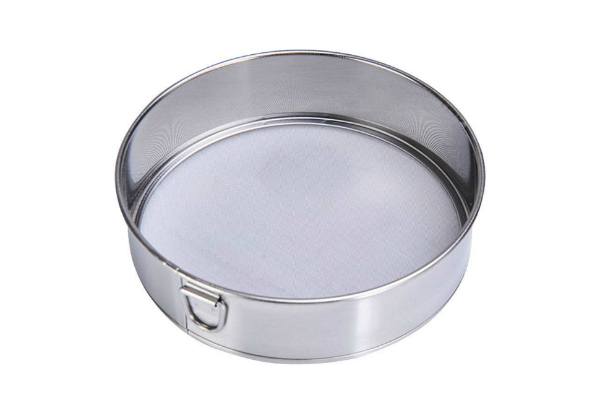
If you have a food processor, you can use it. I don’t like cleaning the food processor…so I usually use a fine mesh flour sifter and throw it in the dishwasher after use.
How to Prepare Kabocha Flan over the Stovetop
No worries, I have a solution for you. You can steam or boil kabocha on the stovetop or microwave it until tender. Then you can follow all the steps until the pressure cooking process and here’s what you need to do.
Step 1: Fill the large skillet or pot with 1-inch water and bring it to a boil.
Step 2: Once the water is boiling, turn the heat to the lowest and gently place the ramekins into the skillet/pot. Cover with the lid and steam the flan for 10 minutes.
Step 3: Turn off the heat but DO NOT open the lid. Let the flan steam with the remaining heat for another 10 minutes.
Step 4: Take out the ramekins and remove aluminum foil. Insert a skewer in the center to see if the custard is set and no liquid coming out. Let cool on the counter until the flan is cool. When they are at room temperature, move to the refrigerator to chill for at least 2 hours, or preferably overnight.
This Kabocha Pumpkin Flan recipe is not only luscious, but it’s also a perfect make-ahead dessert to serve for a special occasion. I hope you enjoy it!
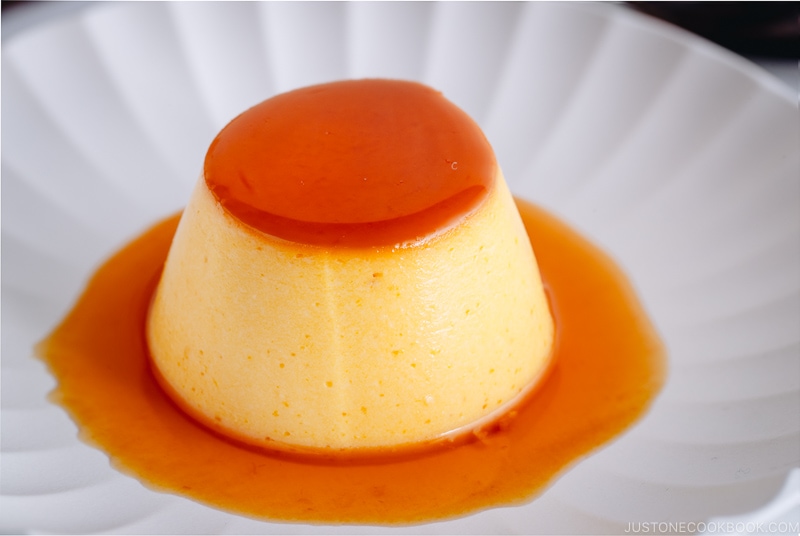
Wish to learn more about Japanese cooking? Sign up for our free newsletter to receive cooking tips & recipe updates! And stay in touch with me on Facebook, Pinterest, YouTube, and Instagram.
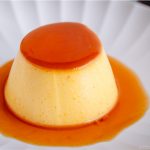
Instant Pot Kabocha Flan
Video
Ingredients
- 3 large eggs (50 g each w/o shell)
- ½ cup milk
- ½ cup heavy (whipping) cream
- 1 tsp pure vanilla extract
- 3 Tbsp sugar
- 15 oz kabocha squash (weighed with seeds)
For the Caramel Sauce
- 4 Tbsp sugar
- 1 Tbsp water
- 2 Tbsp hot water
Instructions
- Gather all the ingredients.
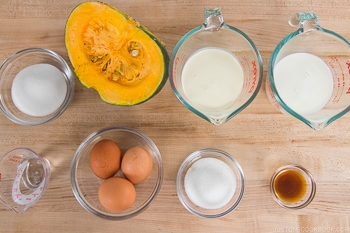
To Steam the Kabocha
- Quickly rinse 15 oz kabocha squash under water and remove the seeds with a spoon.
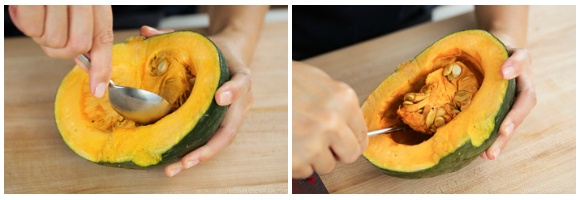
- Cut the kabocha into wedges and then 2-inch pieces.
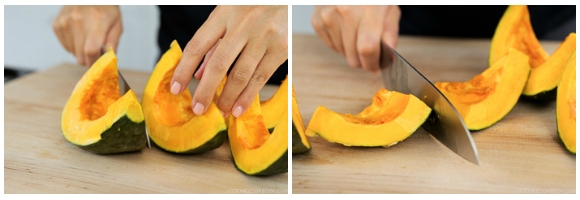
- Fill the inner pot of an Instant Pot with 1 cup water and set a steamer basket inside.
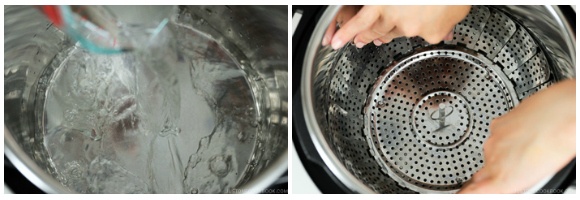
- Put the kabocha in a single layer.
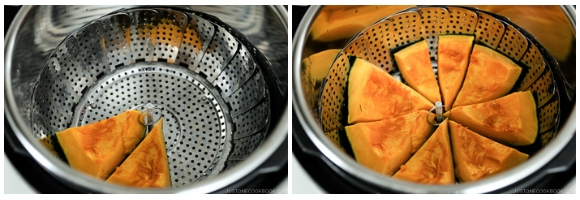
- Close the lid and set to High pressure for 2 minutes.
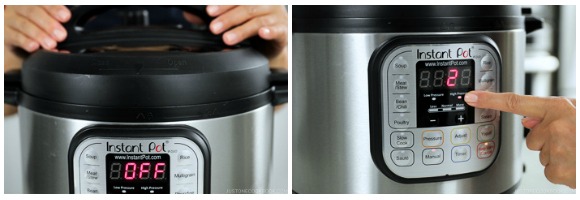
- Make sure the steam release handle points at Sealing and not Venting. The float valve goes up when pressurized.
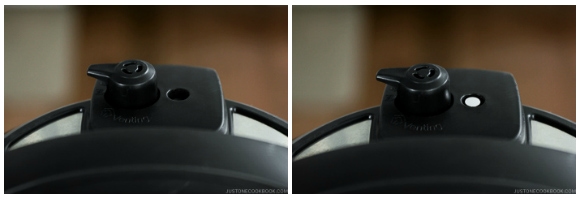
To Make the Caramel Sauce
- While you’re waiting for the kabocha to finish cooking (and naturally releasing pressure for 10 minutes), make the caramel sauce. Boil water in a kettle or saucepan and set aside (you will only need 2 Tbsp hot water). Put 4 Tbsp sugar and 1 Tbsp water in a small saucepan.
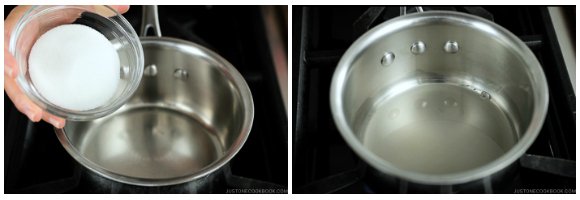
- Gently shake the saucepan to evenly distribute sugar and do not touch until the mixture starts to turn golden brown. Gently shake the pan again to distribute the mixture to have an even color.
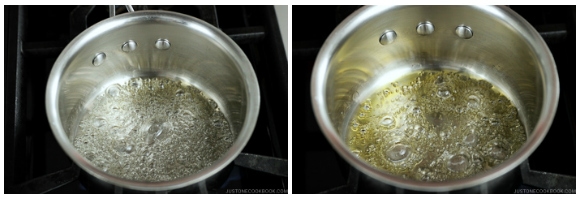
- When the caramel reaches an amber color (I like a slightly darker color, which has a mild bitterness), turn off the heat and quickly add 2 Tbsp hot water to loosen it. The caramel will splash, so use a lid to protect yourself from getting splattered with hot caramel.
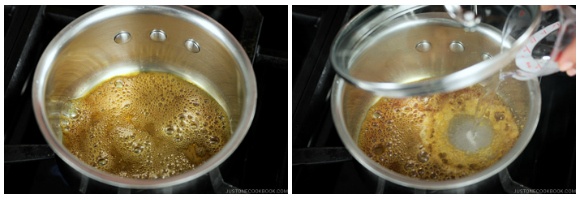
- Swirl the saucepan to make an even mixture. Divide and pour the caramel into 4 ramekins. Allow the caramel sauce to cool.
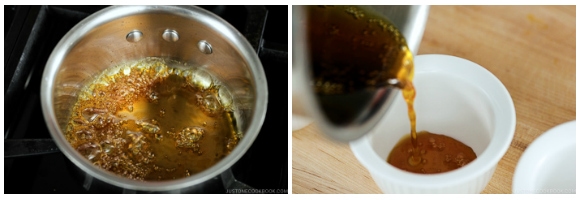
To Make the Kabocha Purée
- When it’s finished cooking, the Instant Pot will switch automatically to the Keep Warm mode. Let the pressure release naturally for 10 minutes (DO NOT EXCEED 10 minutes; I recommend setting a timer.) and then proceed with quick release by turning the steam release handle to the Venting position to let the steam out until the float valve drops down. Hold a kitchen towel over the release valve and do not place your hand or face over it. Only a little bit of steam will be left after 10 minutes of natural release.
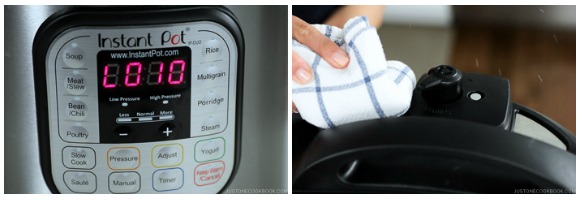
- Open the lid and remove the steam rack from the Instant Pot.
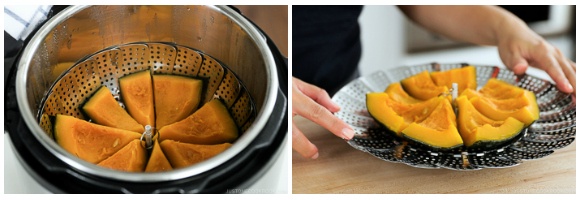
- Use a knife or spoon to remove the kabocha‘s flesh. Discard the kabocha skin (it’s edible, but we do not use it in this recipe).
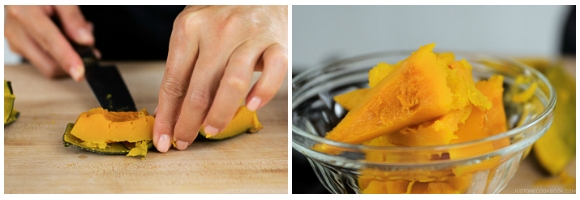
- Now, make a kabocha purée with a flour sifter, fine-mesh sieve (uragoshiki in Japanese), or a food processor. Set the sieve over a sheet of parchment paper and press the steamed kabocha through the mesh with a wooden spatula. Once it’s all done, flip the mesh sieve and take out the puréed kabocha onto the parchment paper. If you’re using a food processor, process the kabocha into a purée.
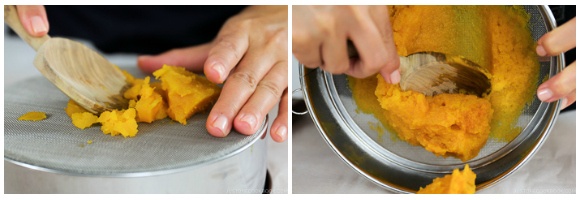
- Measure ½ cup (120 g) kabocha purée from the pile. Tip: With almost 1 lb kabocha, you will have enough to make 4 ramekins, but you may not have enough purée for another batch. It’s hard to predict the real weight of kabocha with the seeds included, so please adjust accordingly. You can save the purée for up to 3 days in the refrigerator. I sometimes make Kabocha Soup with the leftover purée.
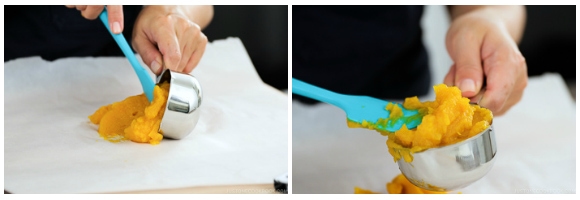
To Make the Custard Mixture
- In a large bowl, combine 3 large eggs (50 g each w/o shell) and 3 Tbsp sugar and whisk well.
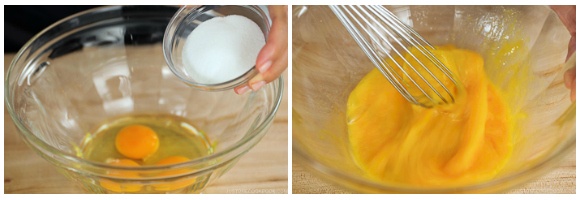
- Add ½ cup milk, ½ cup heavy (whipping) cream, and 1 tsp pure vanilla extract. Whisk to combine.
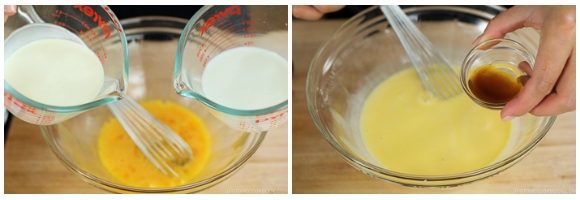
- Add the kabocha purée and mix until thoroughly combined.
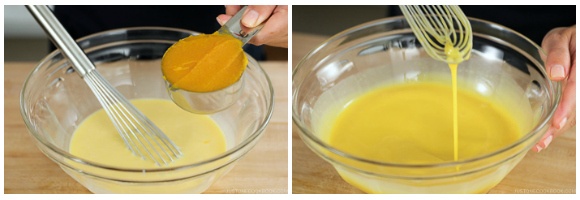
- For the best texture, set a fine-mesh sieve over a large bowl (I use a 4-cup liquid measuring cup) and pass the custard mixture through the sieve. If you have a smaller fine-mesh strainer, you can directly pour the custard mixture over the ramekins.
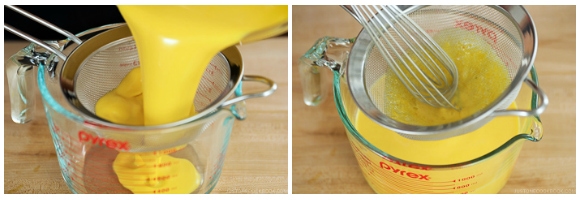
- Divide the custard mixture into 4 ramekins.
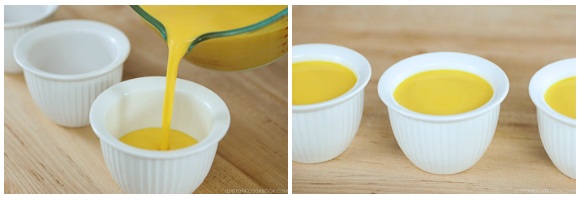
- Cover each ramekin tightly with a sheet of aluminum foil.
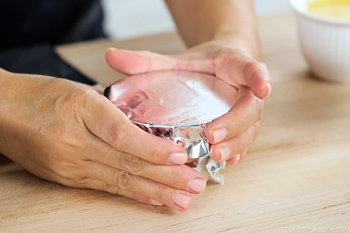
To Pressure Cook
- Add 1 cup water into the Instant Pot and place the steam rack inside.
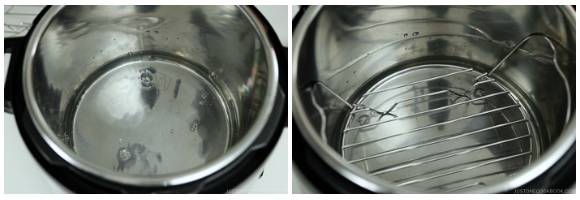
- Put the 4 ramekins on the rack and make sure they are not tilted.
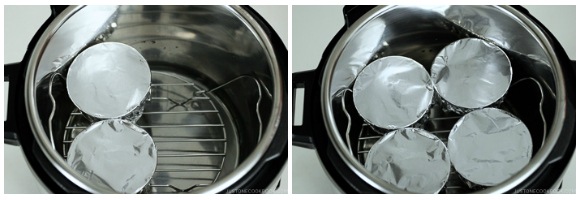
- Close the lid and set to High pressure for 6 minutes. Make sure the steam release handle points at Sealing and not Venting.
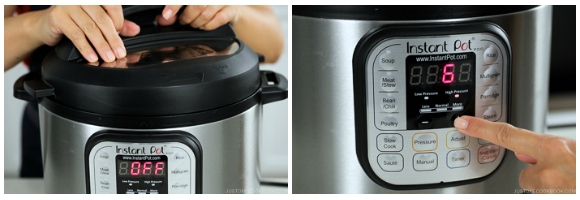
- When it’s finished cooking, the Instant Pot will switch automatically to the Keep Warm mode. Let the pressure release naturally for 10 minutes (DO NOT EXCEED; I recommend setting a timer.) Then, proceed with quick release by turning the steam release handle to the Venting position to let the steam out until the float valve drops down. Hold a kitchen towel over the release valve and do not place your hand or face over it. Only a little bit of steam will be left after 10 minutes of natural release.
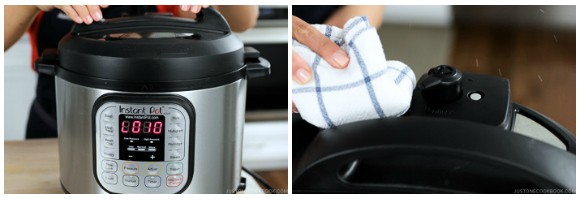
- Take out one ramekin and remove the aluminum foil. Insert a skewer in the center of the flan to see if the custard is set and no liquid comes out. If it’s not cooked through, repeat the pressure cooking process (the cooking time varies depending on your result).
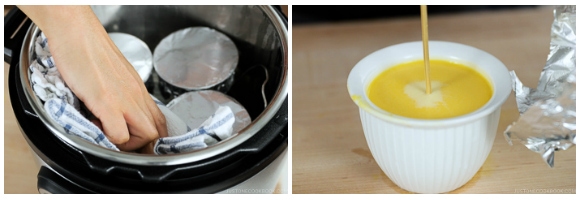
- Remove the ramekins to the counter and let cool until the flan is room temperature. Then, put the ramekins on a tray, cover with a paper towel (to absorb any condensation/moisture) and plastic, and transfer to the refrigerator to chill for at least 2 hours or preferably overnight.
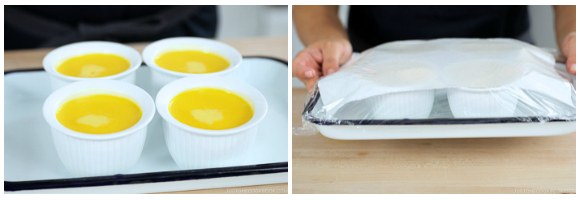
To Serve
- Run a knife around the edges of the ramekins.
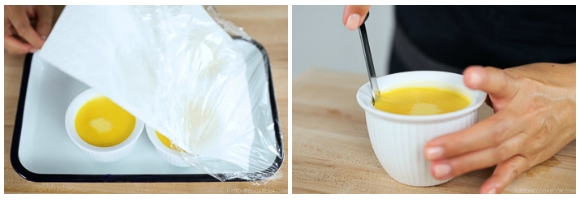
- Hold a ramekin and plate together and shake vigorously a few times to invert the flan onto the plate. Enjoy!
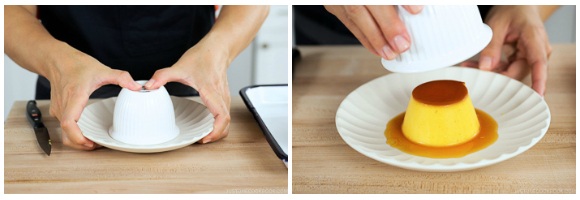
To Store
- You can store the leftovers in the refrigerator for up to 2 days.
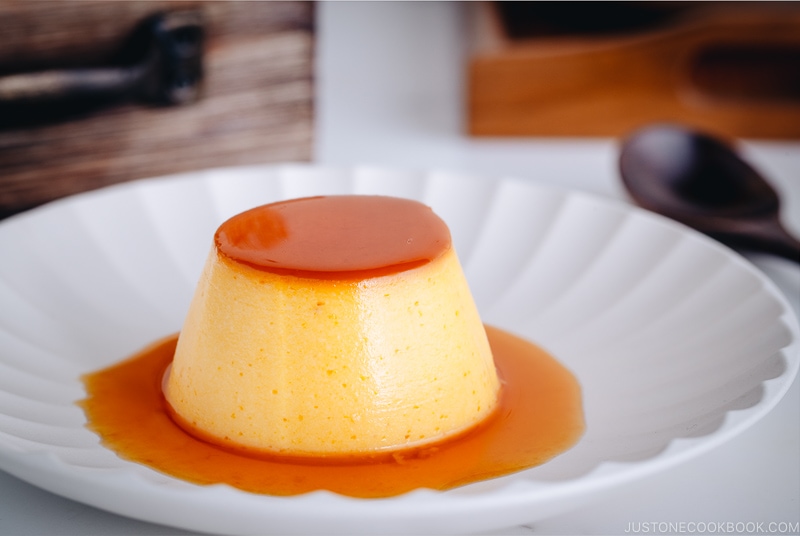
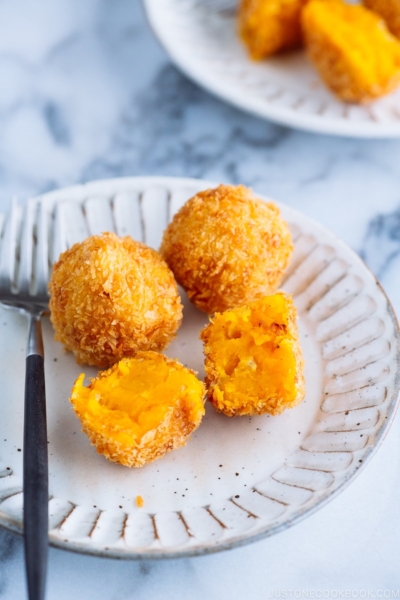
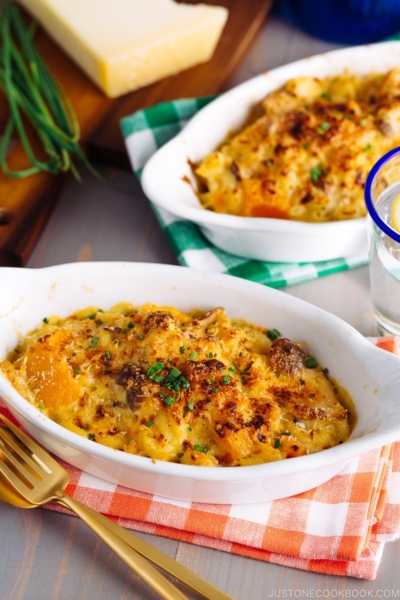
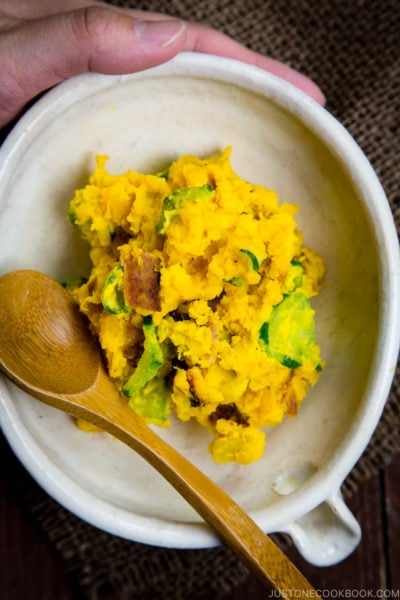

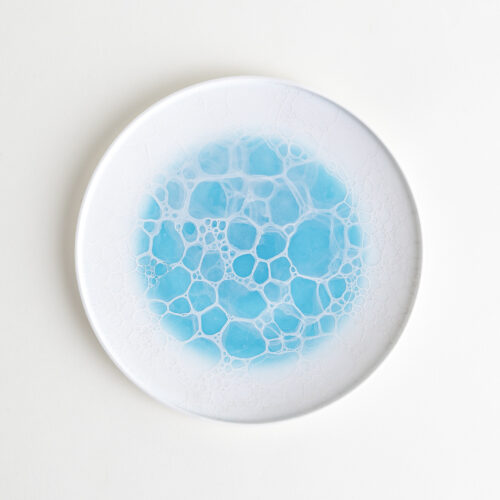
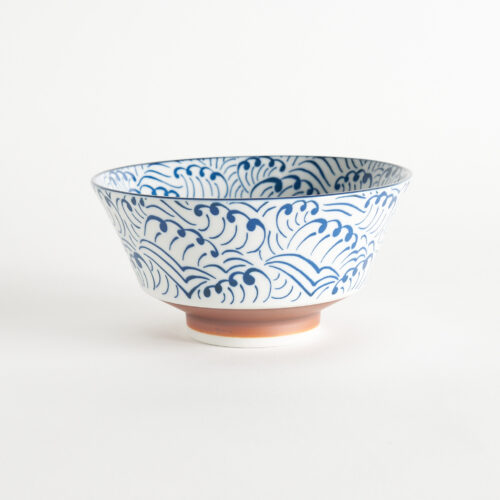
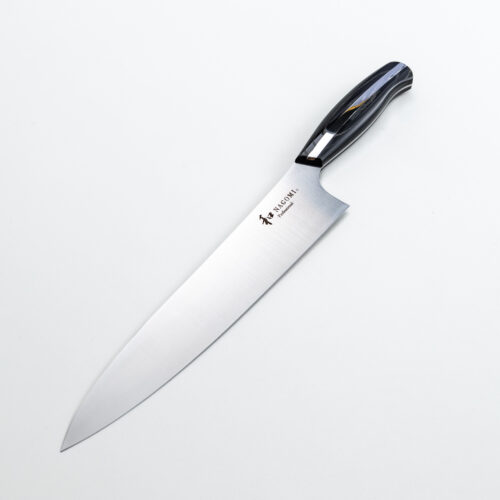
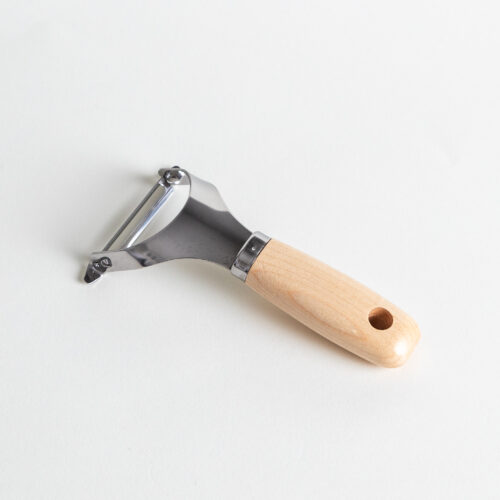
great recipe, but add more than one cup of water to the Instapot because while mine was venting I had a burn alert on the Instapot because all the water had evaporated from the pressure cooking.
Hi Elizabeth! Thank you very much for trying Nami’s recipe!
We hope you enjoyed Kabocha Flan.😊
The instant pot handle points at “sealing” and not “venting” so that the moisture inside the instant pot stays and doesn’t give you a burn alert. (Step 3)😉
We hope this helps you with your next time.
Love it, as everyone that ate it. Super easy, taste is great and the pumpkin is coming through just the right much. Love iiiit
Hi Rebecca! Aww. We are so happy to hear everyone loved it!
Thank you very much for trying Nami’s recipe and for your kind feedback.🥰
Yummy flan! Thanks! I don’t have a hot pot, but it came out fine in my oven, in a Bain Marie.
Hi Jennifer! Wonderful! We are so happy to hear it worked well in a Bain Marie!
Thank you very much for trying Nami’s recipe and sharing your cooking experience with us!
Hello,
is there any reason why I can’t place all the ingredients (except the caramel sauce) into a vitamix blender and give everything a good blending? Would it incorporate too much air into the mixture? I’m thinking this could be a good alternative to pumpkin pie at Thanksgiving!
Hi Naomi! Thank you very much for reading Nami’s post!
Blender should work. However, we recommend puree Kabocha first in the blender, then add other ingredients to mix it lightly so that it would not be over mixing the mixture. Incorporating too much air is unnecessary for this recipe, and you also don’t want to skip passing the custard mixture through the sieve. Step 4 is the key to the best texture.
We hope this helps!
Hi Nami, I just made this recipe using a traditional steamer. When I took it out, the tops looked like cooked omelettes. I cooked it about 10 minutes longer because I used a mini loaf mold instead. What do you think went wrong? Was my heat too high? Or did I steam it for too long?
Hi Ami, We think your mini loaf mold distributes the heat faster than the ramekin, so try lowering the heat and adjusting the cooking time shorter than this time. We hope this helps!
Thanks for your input! Will try that next time. Do you know if the texture will change if I add less/more kabocha in the mixture?
Hi Ami, You are welcome! If you add less Kabocha, it will be more like a regular Flan and, if you add more Kabocha, it will be denser texture. We hope this helps!
I thought I would give this recipe a try for Thanksgiving this year, but I think I’m having a problem with the kabocha. I don’t have an instant pot or pressure cooker, so I steamed the chunks of pumpkin for about 20 minutes in a pot with a steamer insert. I let it cool covered in the pot until cool enough to handle, but when I tried to pass it through the strainer it was really dry and very hard to force through. Like baked potato dry. The finished “puree” was stiff and dense like Play-Doh, nothing at all like yours in the video. Did I do something wrong or get a bad pumpkin? Is there some way I can fix the puree?
Hi Neil,
Thank you for trying this recipe!
We think your Kabocha got too dry. Ensure your steamer has a good amount of water at the bottom, and We recommend not leaving the kabocha too long in the pot after your Kabocha is done in a steamer.
Let it cools quickly by taking out and start Step 3. (warm kabocha is easier to work than cold kabocha)
We hope this helps and you can enjoy this Flan at Thanksgiving!
Hi Nami Sensei!
I made this recipe and then… I made it 3 more times! My wife and son LOVE it! My wife is from Hiroshima and I discovered your recipes after the corona virus put us inside forever. We’ve missed our visits to ji chan and ba chan and my family was missing the flavors of Japanese cooking. Your recipes have really done wonders for us, and have helped take the edge off missing family far away in Japan. Thank you so much!
I was wondering about the base of the flan — could you add other flavors to the base in a similar way, like kuro goma, satsumaimo or anko? (I’m sure anko flan is weird, but my son is 8 and would eat cardboard if it had anko on it.. 😂)
Anyway, thank you so much. Discovering your site has brought my family a lot of simple joy. Very grateful to you.
Hi Jason!
Aww. We couldn’t be happier to hear how much joy and excitement Nami’s recipe has brought to you and your family!
Thank you so much for trying this recipe and for your kind feedback.
As for adding other flavors to the base, we have not tested it yet, so not sure how the outcome will be… But it sounds very yummy!
Please let us know how it goes!
Can’t wait to try this
Hi Christine! Hope you enjoy the recipe! 🙂
This looks delicious! I don’t have an instant pot tho, could it be baked in an oven and if so, what temperature and time would you recommend? Thank you!
Hi Cat! I haven’t used the oven to “bake” this recipe so I’m not too sure. As another option, you can stream this on the stovetop, that would be great. If your oven has a steam function, you can use that too.
The flan came out still having a tiny little puddle on top, so I pressure cooked it for another 2 minutes, but it still came out with the puddle. Maybe I got the consistency wrong? or the size of my ramekin wasn’t optimal? (I used those oval and shallow ones usually used for crème brûlée)
I also used brown sugar instead of white sugar (I ran out of white sugar).
One last question, is there a reason you’re using whole eggs instead of just egg yolks?
Thank you so much 🙂
Hi Jerry! Was the puddle look more like an uncooked liquid? Could it possible that the mixture got separated? Knowing that you used a flat one, how did you adjust the cooking time to this smaller ramekin? The sugar should be okay. I use this as base of my recipe (https://www.justonecookbook.com/custard-pudding/).
very very good reciepe of japanese dishes,easy to follow and the result of the taste also fantastic….subarashi.
Thank you so much for your kind feedback! 🙂
Love the idea of making healthier desserts! Will try today!
Thank you and I just subscribe to your weekly posting.
Sj
Hi Sujon! Hope you enjoy(ed) making this recipe and for subscribing to my blog! xo
Do you have an alternate recipe to steam in a large steamer? I have a large aluminum steamer I use for steaming dim sum. Thanks!
Hi Wu! That’s wonderful! I have shared a regular steamer method (Right above the recipe card area). You can follow this step to steam yours in the large steamer. 🙂
This looks great. Thanks for sharing such a detailed recipe.
Thanks so much!
I LOVE Flan! Thank you for your recipe….I do want to try it! Although I have always simply bought a mix in a small box (like Jello!) and made it. The addition of the acorn squash sounds delicious! I’ll need to find a fine strainer.
Hi Barbara! Yeah don’t skip to make it into puree (either food processor or strainer). Flan is definitely tastier when you make it at home. Buy good eggs too. It’s wonderful!